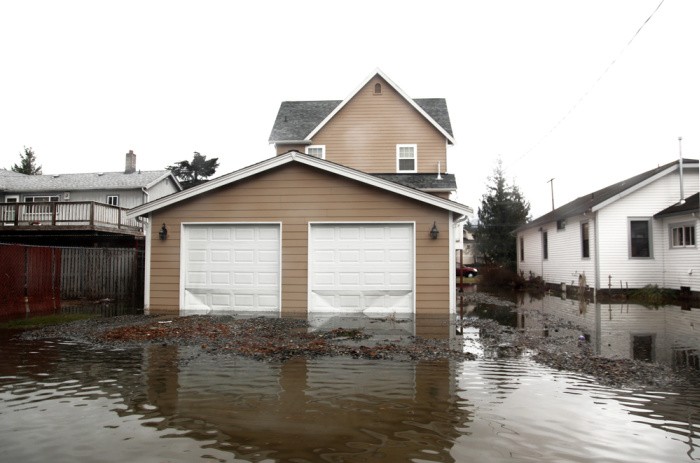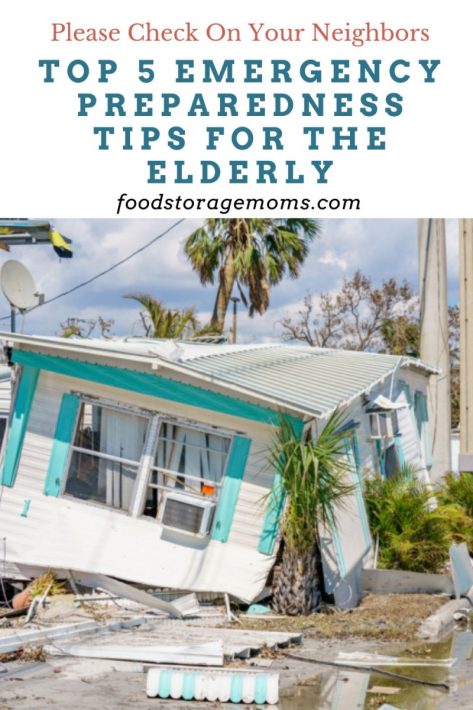
It doesn’t matter whether you’re young or old, natural disasters put everyone at risk. But it makes sense that senior citizens are far more likely to die or be seriously injured from them than young people are. Whether it’s due to problems such as limited mobility or isolation, the elderly have a much more difficult time evacuating during a disaster such as a hurricane or a wildfire. Here are the top 5 emergency preparedness tips for the elderly. In case you missed this post, here are The Best Ways To Help The Elderly.
Top Emergency Preparedness Tips for the Elderly

Did you know that over half of the deaths from Hurricane Katrina were adults over the age of 75? Or do you remember the Chicago heat wave in 1995? Two-thirds of the 700 lives that were lost were men and women over the age of 65. When a wildfire takes place, senior citizens over 85 years of age are 4 times more likely to die from it than any other age group. Studies have alarmingly shown us that less than 1/4 of all senior citizens living in the United States are prepared for a natural disaster.
These numbers are not only astonishing and sad, but they show us that we need to do a better job preparing and helping take care of the elderly should a natural disaster ever occur. It’s also essential for those caring for the elderly to know how to respond in those situations. These are the top 5 emergency preparedness tips for the elderly.
#1. Have a Network of Friends and Family
Having a network of friends and family looking out for you is one way of avoiding being left alone in your home during an emergency. If you need help, don’t hesitate to pick up the phone and call one of them; that’s what they hope you’ll do.
That way, someone can pick you up and see you get to safety. Whether you plan on staying in your home or evacuating to a specific location, make sure that you let them know of your plans.
If you don’t have any friends or family who live close to you, get yourself set up with a medical alert system that can respond to your situation. Having all your contact information printed and kept in a safe place is also helpful. If you have a smartphone, have the names listed in your contacts so you can access them easily.
#2. Plan Ahead
Should you ever have to deal with a hurricane or an out-of-control wildfire, don’t wait until the last minute to decide your escape and the best route. It may already be too late. Plan well for your evacuation, especially if you’ve been warned enough.
Also, be sure to keep up with the emergency broadcasts so that you know what’s going on around you. Should you have to leave your home, you’ll need to know where you’ll stay, whether it’s a shelter, hotel, or with family or friends living outside the affected area.
#3. Gather the Basics
No matter what age you are, it’s a good idea to gather up an emergency kit capable of holding you over for a minimum of 3 days. Some preppers store an extra emergency kit in the trunk of their vehicle in case they have to evacuate in a hurry.
That way, you don’t have to worry about making several trips to your car. Here are a few of the basics and other essentials that you should consider putting in one or more designated areas:
- Food (non-perishable food items)
- Water (four gallons of water a day per person)
- Prescription medication (see if your doctor will provide you with 90 days worth)
- Spare oxygen tanks/batteries
- Cpap Equipment
- Portable ventilator (for those who need it)
- Batteries for hearing aids
- First-aid kit
- Flashlight with extra batteries
- Hand-crank weather radio
- Toiletries and personal care items
- Extra blankets and sleeping bags
- Extra clothing and raingear
- Legal and essential documents (keep them in a waterproof container)
#4. Find the Safest Place In Your Home
You need to know what the safest place in your home is. If a disaster arrives, you’ll know where to go for shelter. When dealing with a tornado, the best place to go is usually your basement or the bathroom.
Get as far away from windows and exterior doors as possible. Other options include hiding underneath staircases or in the closet.
For those living in a mobile home, be aware that no room in your house is safe during a tornado. You need to head to the nearest permanent structure and have a prearranged method of getting there.
When you’re dealing with a hurricane and have decided to bunker down in your home, head to the innermost room on the first floor and avoid windows and exterior doorways.
#5. Avoid the Heat
It’s not uncommon for extreme heat to follow behind a hurricane or a tornado that has ripped through an area. Hot temperatures can be deadlier than the natural disaster itself.
To make matters even worse, chances are high that your power will not work afterward. This type of scenario has claimed far too many lives, especially among our senior citizens.
If this were ever to happen and the temperature in your home reached a dangerously high range, you would need to consider going somewhere else with air conditioning.
In the meantime, whether it’s your local community center, a restaurant, a hotel, or staying with a loved one. Don’t become a statistic as you try and hang in there until the power returns.
For Everyone Else…
Maybe you’re not an elderly person who needs care. Please take a minute to consider your situation. Do you live beside or down the street from an elderly person living alone?
Or maybe your parents or grandparents live further away from you? Please don’t wait until there’s a disaster at their location to see whether they’ll be okay.
Get with them now and find out what their arrangements are if a natural disaster were to strike. Offer them any suggestions for preparation and let them know that yours is a number they can call if they need help.
Final Word
There’s no denying that the elderly are more vulnerable during a natural disaster, but that doesn’t mean they can’t weather the storm. With a bit of extra preparation, planning, and help from friends and family, senior citizens shouldn’t face the dangers and obstacles alone. What are some top emergency preparedness tips for the elderly that you’d like to share? May God bless this world, Linda
Copyright Images: Forest Fires Deposit photos_48123941_s-2019, Flooding in Front Of House Depositphotos_1072481_S By Konstantin32, Mobile Home Damage by Hurricane Depositphotos_612249496_S by felixtm
The post Top 5 Emergency Preparedness Tips for the Elderly appeared first on Food Storage Moms.
from Food Storage Moms
No comments:
Post a Comment